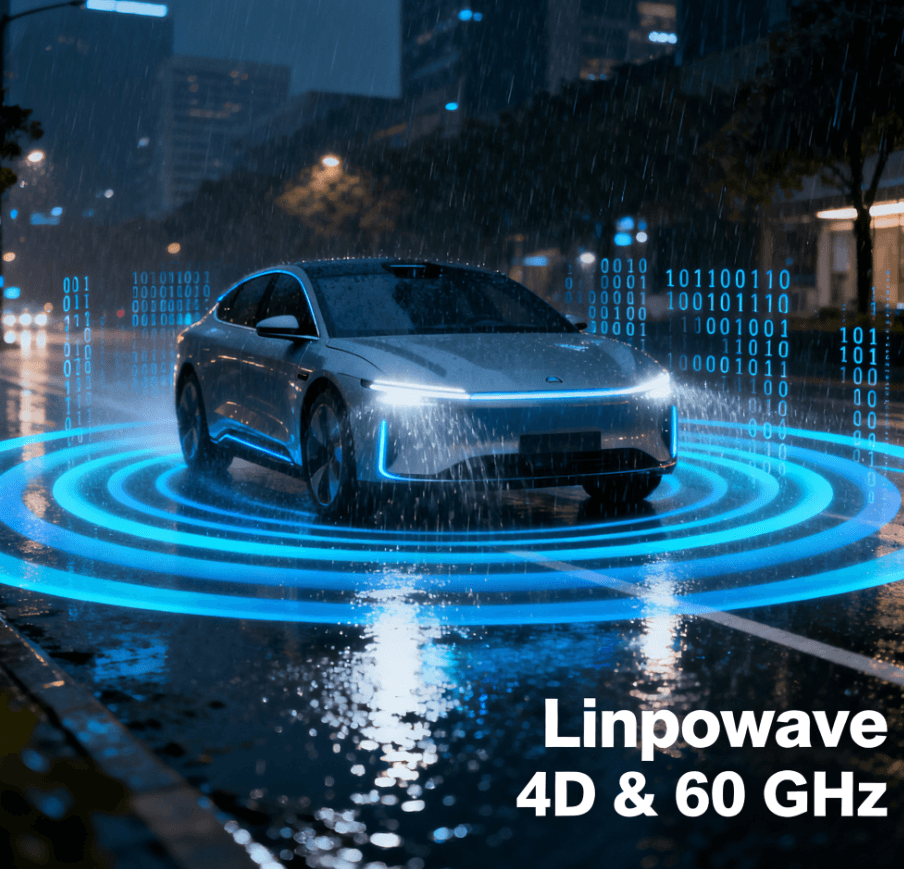🚀 The Invisible Guardian: How mmWave Radar Redefines “Privacy” and “Reliability” in Smart Mobility and IoT
Abstract: The Core Value of Next-Generation Sensors
In the age of intelligent systems, the public’s expectations for technology are higher than ever — but so are their demands for data privacy and all-weather reliability. Traditional optical sensors such as cameras and LiDAR often expose critical weaknesses in adverse environments or privacy-sensitive applications.
According to Nature, LiDAR systems experience up to 30% failure rates in fog and rain, while cameras face increasing scrutiny under global privacy regulations like the EU General Data Protection Regulation (GDPR) and the HIPAA Health Privacy Act.
Now, millimeter-wave radar (mmWave Radar) — with its non-visual, all-weather, and high-precision capabilities — is emerging as the ultimate solution to these challenges. The rise of 4D imaging radar in autonomous driving and 60 GHz radar modules in camera-free IoT applications is redefining the industry’s standards of sensing performance and digital trust.
👉 Explore our full mmWave radar product portfolio.
I. Overcoming Harsh Environments: The “All-Weather Reliability” Revolution of 4D Radar
For autonomous vehicles, sensor reliability is non-negotiable. mmWave radar, particularly the latest generation of 4D imaging radar, fills the critical performance gap left by optical systems.
📘 Learn more: Introduction to 4D mmWave Radar Technology.
1. Penetrating Visibility Barriers — The Power of 77 GHz / 92 GHz Bands
Operating in higher frequency bands such as 77 GHz or 92 GHz, mmWave radar’s shorter wavelengths enable exceptional penetration.
According to IEEE research, it can easily detect objects through dense fog, heavy rain, snow, and dust — conditions where cameras and LiDAR often fail.
Linpowave’s 4D radar, enhanced with AI-optimized signal processing, achieves a False Alarm Rate (FAR) as low as 0.5%, even under extreme scenarios, ensuring superior system safety and resilience.
2. Centimeter-Level Accuracy Meets AI Intelligence
4D radar introduces the elevation (pitch) dimension, elevating radar perception from point-cloud data to true 3D imaging.
For academic context, see related work on AI-based point cloud detection on arXiv.
High resolution: Capable of centimeter-level distinction, 4D radar can identify small, complex objects — such as manhole covers, tires, or suspended signage — minimizing false detection.
AI fusion: By applying multi-object tracking (MOT) and contour recognition algorithms, Linpowave radars provide vision-like spatial awareness while retaining all-weather robustness.
II. Protecting Digital Boundaries: 60 GHz Radar and the “Privacy-First” IoT Paradigm
📗 More insights: Camera-Free IoT Sensing Solutions.
1. Non-Visual Sensing: A Natural Privacy Shield
Unlike optical sensors, mmWave radar does not capture visual imagery.
Instead, it outputs digital data — position, velocity, distance, and physiological motion — that are inherently non-identifiable.
As such, it naturally complies with strict privacy frameworks like GDPR and HIPAA, mitigating risks of data leaks or hacker-exploited video streams.
This makes mmWave radar the core enabler of privacy-first IoT ecosystems, from smart homes to healthcare facilities.
2. 60 GHz Modules for Non-Contact Vital Sign Monitoring
Linpowave’s 60 GHz mmWave radar module offers outstanding precision for close-range detection and life-sign sensing:
-
Micro-motion capture: The 60 GHz frequency band detects subtle chest movements for continuous, non-contact heart rate and respiration monitoring.
-
Healthcare potential: According to PubMed studies, radar-based vital sign sensing is viable for fall detection, sleep analysis, and elderly care, all without intrusive cameras or wearables — preserving dignity while ensuring safety.
III. Global Applications and System Integration: Building the Smart Ecosystem
The future of mmWave radar lies in cross-domain and cross-technology fusion.
Read more: Intelligent Transportation and V2X Applications.
1. Vehicle-to-Everything (V2X) Collaboration in Practice
Linpowave actively participates in smart transportation infrastructure deployment:
In China’s pilot C-V2X zones, 92 GHz roadside radars provide Beyond-Line-of-Sight (BLOS) perception, enhancing safety under poor visibility.
Field data show that radar-based perception can reduce weather-related traffic accidents by up to 15%, proving its reliability in real-world conditions.
Further evidence can be found in Nature’s radar-based traffic research.
2. The Future of Ultra-Precision Sensing
Emerging research from UC Davis mmWave Lab demonstrates radar’s ability to detect vibrations 1,000 times smaller than a human hair, showing potential for structural health monitoring (SHM) in bridges, wind turbines, and industrial IoT.
Linpowave is applying this principle in its ongoing work on non-invasive, predictive maintenance solutions, aligning with global trends toward sustainability and operational safety.
IV. Empowering Developers and Shaping the Future
The global ADAS mmWave radar market is projected to grow at nearly 20% CAGR, reaching USD 49 billion by 2032 (source: Markets & Markets). Linpowave continues to be a key contributor to this momentum.
1. Developer Ecosystem and Rapid Prototyping
To accelerate innovation, Linpowave provides a full developer support suite:
-
Open SDKs: Comprehensive 77 GHz / 60 GHz Radar SDKs with drivers, AI interfaces, and full documentation.
-
Rapid prototyping tools: Designed for OEMs, Tier-1 suppliers, and IoT developers to build ADAS prototypes, vital-sign monitoring systems, or industrial sensors efficiently.
🔗 Visit the Developer Tools & SDK Documentation Center to get started.
2. Vision for the Decade Ahead — Privacy and Reliability as Core Values
By 2030, global IoT adoption is expected to exceed 30% penetration.
In this data-driven world, only technologies rooted in Privacy-First and Reliability-Driven design principles will gain long-term trust.
mmWave radar stands at the heart of this transformation — enabling privacy-respecting smart homes, high-reliability vehicle perception, and intelligent infrastructure worldwide.
📢 Ready to Build the Future?
Are you prepared to solve the challenges of smart mobility and IoT privacy with next-generation radar sensing?
👉 Visit the Linpowave Developer Portal to access the 77 GHz / 60 GHz SDKs, explore real-world examples, and start building your own reliable, privacy-first intelligent applications today.



